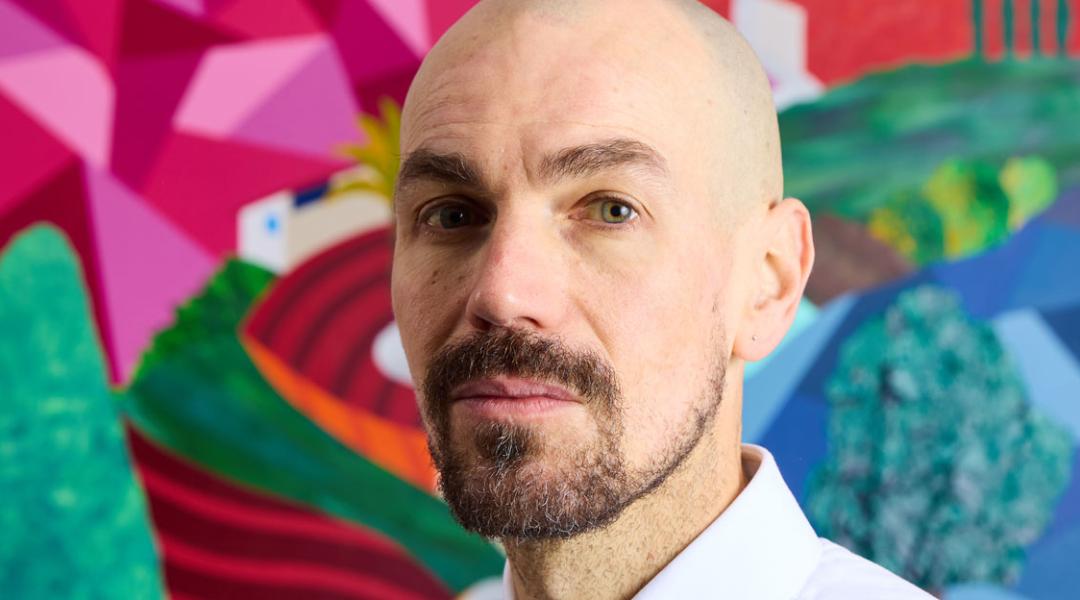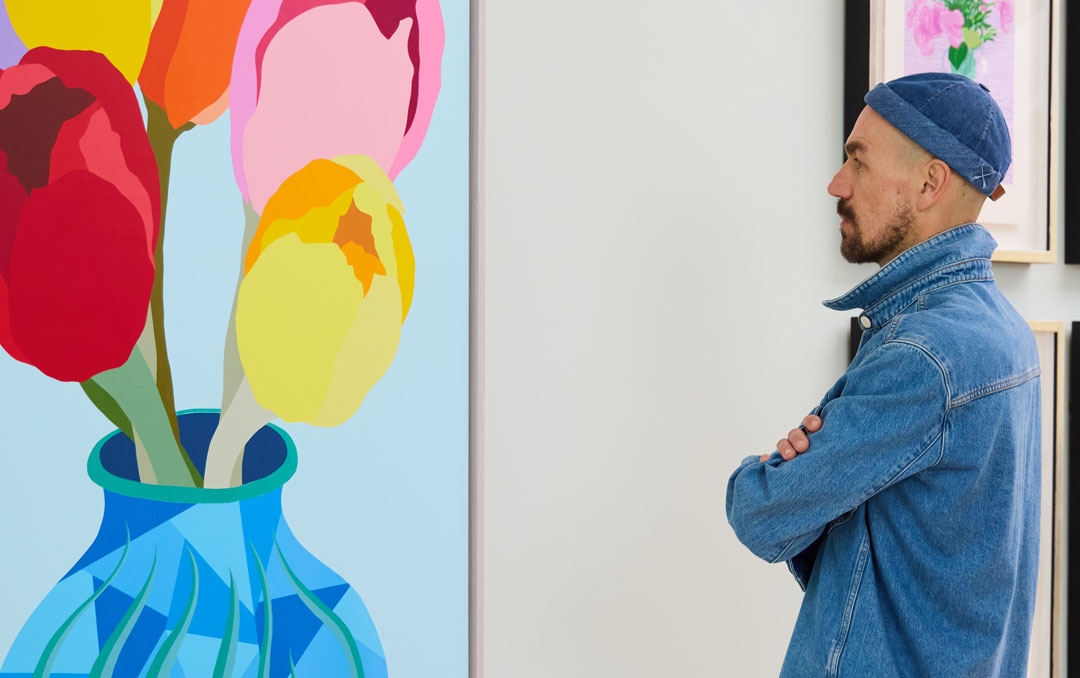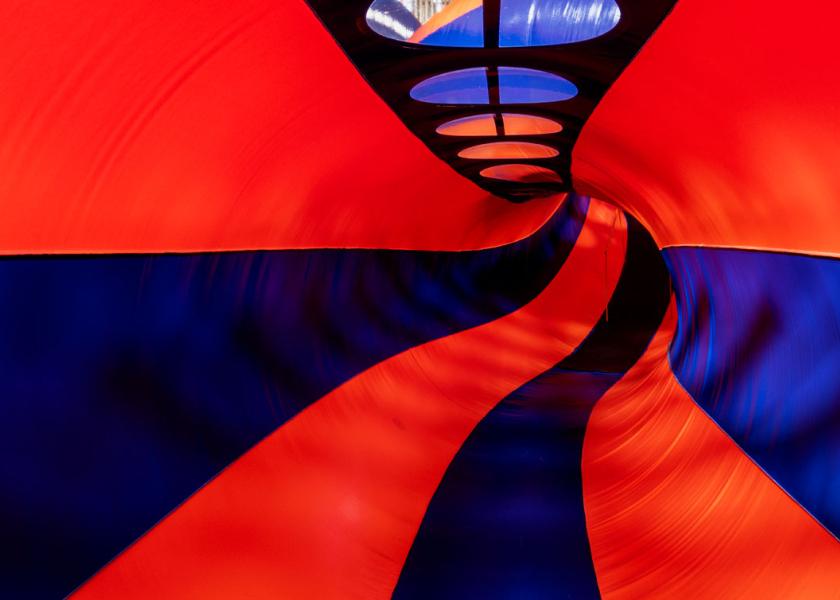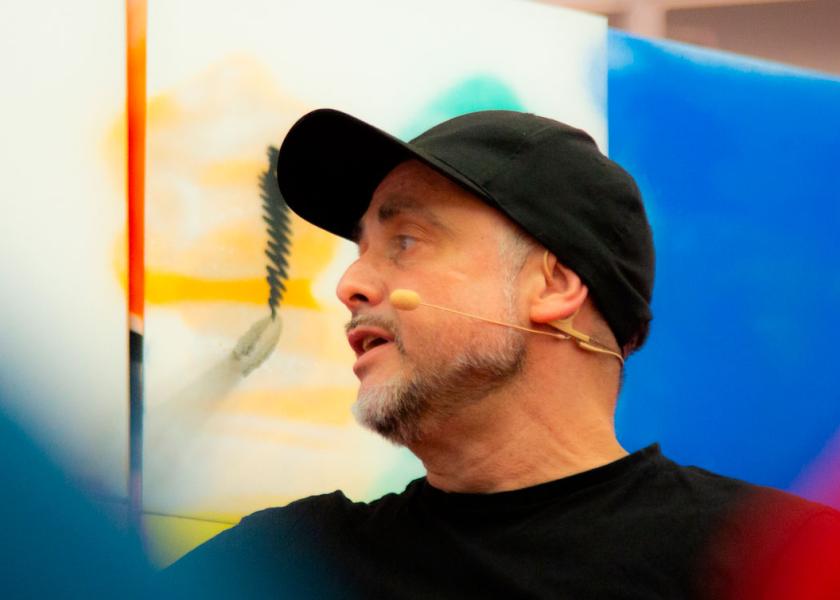Pedro Paricio
Art is like an act of faith

“Art is like a thunderbolt that hits you. You don’t choose it, it chooses you.” A mission Pedro Paricio accepted passionately: “Some days have been better than others, but my willingness to get up every day to go to the studio has not changed.” Because, he declares, “it’s hard for talent to bloom without passion.” A talent that, at the age of 27, caught the attention of the prestigious Halcyon Gallery in London.
Every day, Pedro Paricio (Tenerife, 1982) diligently goes to his studio because without painting, he confesses, he’d feel like a fish out of water. “For me, painting is like breathing,” he declares. With impassioned excitement, our conversation kicks off with artificial intelligence—“it has no influence on my current work, but I have researched it because I’m interested in it”—, and pauses on the figures of Bergman—“I’ve seen 25 of his films in a row and I’d recommend Shame because, given the rise in armed conflicts, it is spot on”— or Van Gogh—“When I read his first letters, I was fascinated by his ability to describe the fields that he then ended up painting”—.He also confesses his love for languages —“they help me to broaden my mind, now I’m learning French”— or the importance of his family—“my painting and my family are binding, without them I wouldn’t be me.” This painter from the Canary Islands conveys an insatiable thirst for knowledge because he considers that learning is “essential to move forward.”
Years ago, your talent caught the attention of Halcyon Gallery in London. What do you think they saw in you?
You’d have to ask them (laughs). When an international gallery that has access to all the artists in the world comes looking for you, it’s because they see something unique, something special. But saying that about oneself is like blowing your own horn, right? Big galleries usually bet on renowned artists because young ones involve more risk. I was really lucky; they believed in me when I was 27 and I became the youngest artist at the gallery. My paintings were hung next to Picasso’s.
Before that, you lived through uncertainty. Why didn’t you give up?
I didn’t give up because I believed in myself and in my work. I couldn’t do anything else because art is like a thunderbolt that hits you. You don’t choose it, it chooses you. For me, painting is like breathing, not doing it is inconceivable. I’d feel like a fish out of water. Some days have been better than others, but my willingness to get up every day to go to the studio has not changed. Art is an act of blind faith.
“Talent is like a diamond hidden underground, you need to have the ability to sink your hands into the earth and delve deeper no matter what”
Going back to talent, which is its main ingredient?
Talent is a gift, either you have it, or you don’t, but it requires passion. It’s hard for talent to bloom without passion. You may have a physical gift for, let’s say, playing basketball because you’re more than six feet tall, but if you don’t work on it daily, it’s not going to be much use. When you’re moved by passion, you think about effort differently. Talent is like a diamond hidden underground, you need to have the ability to sink your hands into the earth and delve deeper no matter what.

The prestigious Halcyon Gallery, based in London, signed Pedro Paricio at the age of 27. © Halcyon Gallery
You’ve always made conversation with the great masters of the past; what pushes you to do so?
Learning. Civilisation is a path towards learning, it’s essential to move forward. Without learning, we’d do the same things believing they are new, and that’s fooling yourself. You can’t break with the past without knowing it. You need to know what the great masters have done and find your own voice, that is, bring art forward by building your own discourse.
You’re an artist who absorbs influences from other disciplines, like film, literature, or music. Is curiosity one of your driving forces?
Yes, but curiosity also comes from passion. When I’m not painting, I’m reading or watching a film. I feel anxious to learn and I’m really interested in culture and science. I’ve been following quantum physics for years and dedicated some sculptures to it when people didn’t know anything about its impact.
“You need to know what the great masters have done and find your own voice, that is, bring art forward by building your own discourse”
Colour is one of the distinguishing traits of your work. When did you hear it calling your name?
Always. It has to do with my personality, which is quite positive, and with my passionate view of the world. My Canarian nature, which is generally happy, also plays a role. Where I come from, because of its geographical location, light is reflected differently and that has also influenced me. I see colours and I freak out; they all look saturated to me.

Colour, influenced by the light of Canarian Islands, is one of the distinguishing traits of Pedro Paricio. © Halcyon Gallery
From the first brushstroke to the last, you work alone and in a very traditional way, why?
I need to feel like I’ve given each piece my all to go to bed happy. I don’t care if people like it or not, what matters to me is that my dedication has been complete. I establish a dialogue with the piece, I cannot impose myself on it, but I also cannot leave it to its own volition. It’s like a child, which only escapes your influence when it leaves home. The piece goes freely into the world and finds new audiences over time, it has a life of its own which is infinite. A piece can encapsulate the soul and conscience of a time, that’s why art lives on and paintings from centuries ago still speak to us.
In the era of mass consumption, what can an artist do to stand the test of time?
For me, it depends what you bet on, you either bet on art, or you bet on consumption. Writing and being a writer isn’t the same, right? Now, 90% of creations are conceived for entertainment—this happens with books, films, paintings— and success can be circumstantial, fruit of being on trend or of marketing. Most of those pieces will disappear because time is a great decider of what will last and what won’t.
“I’m privileged because I do what I like. How many people can say that? It’s true that I work myself into the ground, it’s like a disease”
And what role does social media play? As an artist, can you remove yourself from any commercial concern?
As an artist, you can remove yourself, but someone will have to do it for you. Because art is one thing, and the art world is another. If you spend more time on social media than painting, that’s bad. But it happens. There are artists who say they spend several hours a day on Instagram, and I wonder, when do they paint? (laughs). Maybe that works for them. If you’ve gone into art to make money, art is a mere excuse to you.
At the beginning, we’ve spoken about how hard it is to get into the art world, but what about staying in it? What’s your secret?
Success is a double-edged sword because it can be the end of you. You can die from success. This is why the most important thing is to throw yourself into your work no matter what, as if it were your mission. Knowing whether you can pay your bills at the end of the month or not is different, but the important thing is to not get comfortable. If you take notice, all the big names who have influenced culture were people who were committed to what they do. That was their secret. And it has nothing to do with productivity because we each have our own creative process. I’m privileged because I do what I like. How many people can say that? It’s true that I work myself into the ground, it’s like a disease, like a fever.


